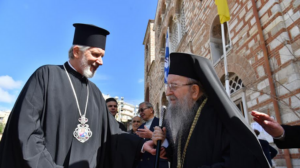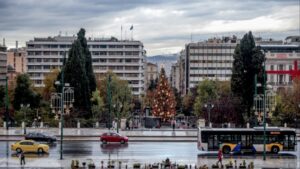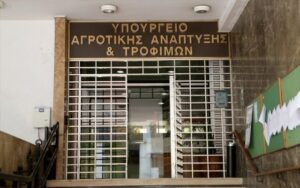Your All-Holiness Metropolitan Anthimos of Thessaloniki,
Reverend Clergy,
Honorable State Officials and members of the Armed Forces,
Beloved Brethren,
I am here in Thessaloniki today, at the Church of the Great Martyr St. Demetrios the Myrrh-Gusher, having had the exceptional honor of representing His All-Holiness Ecumenical Patriarch Bartholomew at yesterday’s magnificent concert given by the Youth Symphony Orchestra of Greece (SONE) under the direction of its maestro Mr. Evangelos Arambatzis, and I take this opportunity to convey our Patriarch’s paternal wishes and blessings to all of you.
Today, with the canonical permission of His All-Holiness Metropolitan Anthimos of Thessaloniki, to whom I express my deepest gratitude for his hospitality, as well that of this church’s Presiding Priest the Very Reverend Archimandrite Fr. Damaskinos, God has shown me worthy to celebrate the Divine Liturgy at this sacred palladium of our Orthodox Christian faith and, together with you, confess its sacred doctrines during the celebration of the restoration of the holy icons and the veneration of the undefiled icon of God Incarnate.
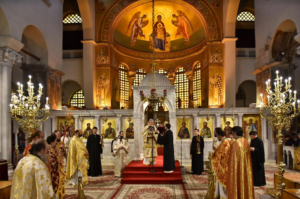
This veneration presupposes the coexistence of God and man and their journey together in life, our reciprocal containment and return to the condition in which we existed in Paradise prior to the fall of Adam, as is mentioned in the excerpt of the Orthodox funeral service as a prayer expressing a nostalgia for the past: “return me to the state of Your likeness and restore the beauty of old.”
His Eminence Metropolitan Markos of Chios notes in one of his sermons that “man has a tendency to return himself to the God-like state he lost.” Of course, our meeting with Christ may be reminiscent of the first words of disbelief uttered by Nathanael when he met the Teacher: “is it possible for something good to come from Nazareth?” Christ the God-man is something new and therefore subject to dismissal, especially by the Athenians, who were immersed in Aristotelian logic, and so, upon first hearing St. Paul the Apostle preach about the Cross, were unable to fathom the miracle of a “tangible” God, which is something that defies logic.
St. Nicholas of Ochrid focuses on the festal qualities of the day when he notes that “this day reminds us not only of a victory or a victor, but rather, of the long series of victories and an entire army of victors. This is a victory of the Church in its entirety.”
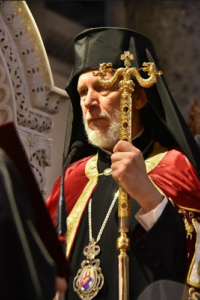
Two great saints, Archbishop Luke of Crimea and Photios the Great, underscore the evil wrought by the iconoclasts, “through their perverted minds and hardened hearts, proclaiming the icons to be idols and the veneration of icons to be idol worship.”
The former castigates “those individuals who tore Christ’s tunic asunder” and caused division in the bosom of the Church, such as the iconoclasts, while the latter refers to the sacred doctrines, noting the following: “however, in the pure and most sacred faith of the Christians, which is very precise due to its sincerity and forthrightness, its exaltation and integrity, when someone tries to interject even a small bit of perversion or novelty, this perversion and adulteration becomes immediately apparent and can be discerned when compared to the truth and upright teaching. The nobility of the pious doctrines cannot suffer this adulterated concoction for even a little while.”
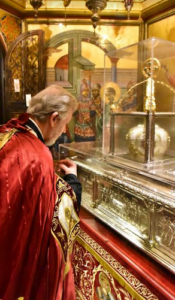
Metropolitan Nikolaos Selentis of Chalkis offers a very illustrative explanation of the theological dimension of the term “in God’s likeness:” “If someone were to enter this church that we are in, remove the icon our Lord, which is here on the icon-screen/iconostasis, take it down and start to kick it, spit on it, curse at it, and trample upon it, what would we all say? That he is impious.
However, if I were to take another icon, which is worth much more than an icon made of wood and paint – the icon which is MAN, fashioned in God’s image, for whose sake God came down from the heavens, became man, was born in Bethlehem, presented Himself in the temple in the arms of Simeon, was baptized in the Jordan River, and was entombed in the Holy Sepulcher…if I take this icon of humanity, of any person, and trample upon it, curse at it, slander it, subject it to injustice and exploitation, what then am I? Even more impious.”
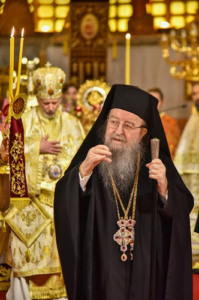
St. Justin Popovic reassures us of the above, noting that “by preserving God’s living image in this world, the Orthodox Church preserved mankind; it preserved Christ as a human being. God Himself became man to find this divine Image – this living divine Image – in us humans … to restore His Image in man.”
According to the Gospel heard on the Sunday of Judgement, the Just Judge shall render final judgement via the marginalized people of this world. Henceforth, they shall serve as the new criterion of our salvation and become our judges! The hungry, thirsty, strangers, naked, sick, and imprisoned – these six categories of people constituting the fringes of contemporary society!
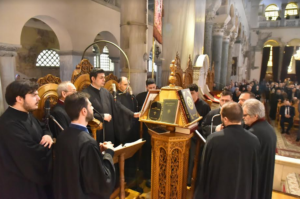
From now on, our will shall determine our eternal future; in other words, if we will adhere to the admonition of the Gospel, so that our perspective on life may become feeding the hungry and visiting the imprisoned, as a small acknowledgement of the presence of these priceless brethren in our lives, who are in such great need of our caring, and not approaching them with an uncharitable charity that lumps them into the category of a “burden upon the earth.”
For those still wondering why the Lord shows such intense appreciation and insists upon our displaying love to the least and most marginalized of our brethren, perhaps it is because in the simplicity of their poverty we are able to discover and uncover our own face, our own spiritual nakedness or magnanimity and philanthropy, devoid of the embellishments of material and spiritual vanity and self-aggrandizement.
Perhaps it is because in the face of these least of Christ’s brethren, the true image of the God-man – His countenance – can be seen; not in glory, but in humiliation, during the time of His passion, to such a degree that we ourselves may wonder “where has Your beauty gone?”
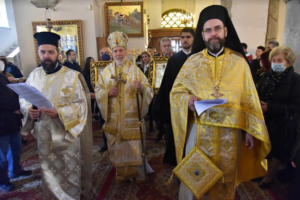
Let us not forget that for our prayers to reach God, they must first pass through the heart, soul, and tears of our fellow man, who is our “alter ego”!
In the midst of this national mourning that we all going through, let gather together as Greeks, in a spirit of devotion to God, to celebrate today’s feast of Orthodoxy. This celebration encompasses a living Greek Orthodox Christianity, as expressed by the superhuman efforts of the Greek rescue teams, who were the first worldwide to arrive in Turkey and Syria to rescue our earthquake-stricken fellow men and women from the rubble, placing their own lives at risk throughout the entire time.
It encompasses an empirical Greek Orthodox Christianity that was illustrated by the endless lines formed by volunteers rushing to donate blood for our injured brethren at Tempi.
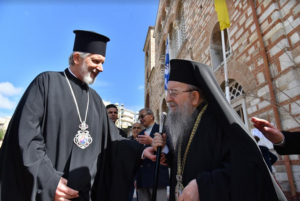
It encompasses a continual journey of the Parthenon and the Haghia Sophia, as expressed in the emotional tears streaming down the faces of the proud young Greeks – our own modern-day heroes – who compete and excel in the Olympics, the students being awarded at international competitions, our national benefactors, our world-renowned compatriots from the sciences, the arts, and business.
All these people dare to dream, dare to make their dreams a reality, because they adorn our society and our Nation with their achievements. Because they teach us – all of us – who live within the borders of Greece, as well as in the larger Greece existing outside our national borders, all across the world, to dream together, to work together, to learn from one another, and to trust one another, since unity, concord, and peaceful co-existence are both a necessity and a virtue.
May today’s ecclesiastical celebration serve to spark intense thought in each of us – individually and collectively – regarding the degree to which we emulate all those persons honored during today’s feast; namely, the heroic saints of our faith, the champions and Olympic victors of the spiritual contest.
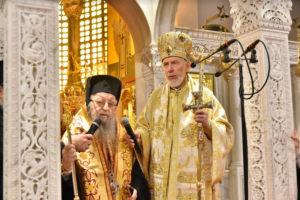
Let us ask ourselves whether the rubric for the course we have set and our identity, the truth of our liberty as modern-day Greeks and our religious conscience can be summarized in the exaltation derived from the verses of our two national anthems: “sprung from the sacred bones of the Greeks” and “O Champion General, we inscribe to you the prize of victory.”
Beloved brethren,
“This is the faith of the Apostles, this is the faith of the Fathers, this is the faith of the Orthodox, this faith has established the Universe.” Amen!
Ask me anything
Explore related questions
